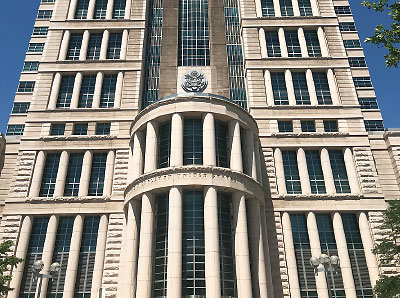APA Joins Amicus Brief Opposing Abortion Restrictions
Abstract
A South Dakota law, which has been blocked by a federal court since 2011, would require pregnant women to receive counseling from a “pregnancy help center” before receiving an abortion, even after consulting with their physicians about the procedure.

APA joined an amicus brief challenging a law (now under injunction) in South Dakota requiring women to receive additional, nonmedical counseling before receiving an abortion. The lawsuit was filed in the 8th Circuit Court of Appeals, which is based primarily at the Thomas F. Eagleton United States Courthouse (pictured) in St. Louis.
APA has joined numerous health care professional organizations in filing an amicus brief to a lawsuit filed in the 8th Circuit Court of Appeals. The suit challenges a South Dakota law that would force women to receive counseling at a nonmedical facility before receiving an abortion.
The lawsuit, filed by the ACLU and Planned Parenthood Minnesota, South Dakota, and North Dakota, was originally filed in 2011 to prevent the enforcement of House Bill 1217 in South Dakota. The bill requires a woman seeking an abortion to visit a so-called “pregnancy help center” (PHC) after an initial consultation with her physician and before she receives the abortion. The help center then conducts a private interview with the patient in which she is informed about what services are available “to help the pregnant mother keep and care for her child” and discuss the “circumstances that may subject her decision to coercion,” according to the text of the bill.
Though the bill passed the legislature and was signed into law, it is not in effect. A South Dakota federal court granted a preliminary injunction in June 2011 and upheld that injunction again in 2020 against a motion to have it dismissed. But in August 2021, South Dakota Gov. Kristi Noem and other defendants on behalf of the state filed an appeal with the 8th Circuit Court of Appeals.
APA filed its amicus brief along with more than a dozen professional organizations, including the American College of Obstetricians and Gynecologists, the American Academy of Pediatrics, and the AMA. The brief details the numerous ways in which HB 1217 puts patients’ health at risk, undermines the relationship between physicians and patients, and presents an extraordinary burden for those seeking abortion services, especially low-income women.
Requiring a patient to submit involuntarily to a private interview at a pregnancy help center is “directly contrary to well-established principles of medical ethics,” the brief states. The requirement further violates patient autonomy and intrudes on the privacy of the patient-physician relationship, suggesting “that a physician is otherwise incapable of securing informed consent.”
“Laws should not interfere with the ability of physicians and patients to determine appropriate treatment options and communicate in the way that best advances patients’ health care,” the amicus brief states. “The compulsory, hostile counseling imposed by the [pregnancy help center requirement] creates the harmful implication that informed consent does not work as intended and that patients are incapable of making decisions in consultation with their doctors regarding their own care.”
Under South Dakota law, women are already required to make two trips to receive an abortion, one for an initial consultation with their physicians and another for the procedure itself. Adding yet another trip for an interview with a pregnancy help center simply adds to the burden patients experience, the brief argues. “Each added trip exacerbates difficulties in finding childcare and money for travel, taking time off work, or justifying absence to an abusive partner opposed to the patient’s choice,” the brief states.
The mandate will further cause delays in care, as it does not include a timeframe by which a pregnancy help center must schedule the counseling appointment. That delay can pose risks to patients’ health, as women with underlying conditions can experience pregnancy-related complications, the brief explains. Additional dangerous conditions, such as preeclampsia, can also develop during pregnancy.
Denying a wanted abortion can also negatively impact a patient’s mental health, increasing the likelihood of anxiety, low self-esteem, and lower life satisfaction. “Long term, patients denied an abortion are more likely to remain with abusive partners and in poverty, resulting in collateral mental health burdens,” the brief states.
The injunction that originally blocked the law in 2011 remains in force, and the law will remain blocked while the case is litigated, according to an ACLU media release. ■



